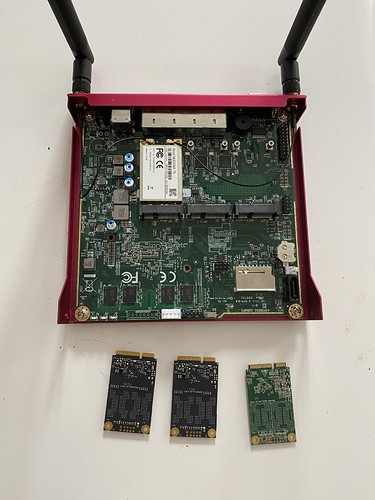@carsten
Hi Carsten!
Make no mistake, I fully agree with this statement:
Sorry, but NethServer is NOT a viable virtualisation host in my opinion.
There are hardly ANY integrated tools like Backup or whatever.
It does work, but in my Opinion NOT really usable. Proxmox is sooooo much stronger than this.
As a firewall, the DNS isn’t usable in NethServer, the DHCP has plenty of limits and “gotchas”.
No possibility to set up CNAMES, MX, PTR or a lot of other options.
The DHCP allows for one scope, finished. No option for a per host/client differing setup, if needed.
I love NethServer, but I do like using a “best of breed” strategy in my Networks.
And at the moment, Proxmox is for me by FAR the best Hypervisor. (And no, I will NOT run file server stuff like NFS / SMB on Proxmox!). Live backups of almost any OS including Windows, File / Folder restore for Windows and Linux, Incremental Backups of VMs, full HA Cluster, possibility for hardware independence, and much, much more. All stuff NethServer doesn’t have.
OPNsense is my choice of best of breed OpenSource firewall, and handles for me the perimeter firewall and network. It has all the options I need, and far more. Wireguard? No problem, even with GUI. NethServer doesn’t have that option. I can install Wireguard on NethServer, but that’s not officially supported on NethServer, there isn’t even a GUI for that. Full internet provider failover AND hardware HA with CARP is something NethServer doesn’t yet offer, but is something I use at more than one client!
Disaster recovery on Neth is NOT as smooth as for example in OPNsense. There, even on different hardware, I ONLY need to allocate the NICs, nothing else. A single config file (No data!) is all that’s needed. NethServer needs both for a successfull restore to different hardware. And even then, it’s not always smooth, and the more NICs, the less smooth.
NethServer is for me the best All-in-one, but without firewall. I will confirm that NethServer’s firewall work very well, including OpenVPN, but for me and my clients, a firewall box is needed. And one WITHOUT any AD or even the possibility to install AD!
However, I do agree that NethServer should have all options as now, but firewall is NOT critical for me. Nor will I ever use virtualization in NethServer.
How do you achieve DNS with NethServer, if you need eg. CNAMES? I used to create more A records instead of CNAMES, but stopped that when I saw that NethServer will hand out PTRs randomly: Any of the A records will become the PTR, but usually NEVER the one you want or need!
I could install BIND on NethServer, but I’d have no GUI available… 
Webmin would work with BIND and provide me with a GUI, but I could just as well use OpenBSD (Or anything else) and Webmin…
DHCP is less critical for me, but I still find it quite limited!
My 2 cents
Andy
PS:
I do have a PCengines spare box, and a spare 1-2 SSDs for that, so I’m also playing around with a minimalised NethServer on a APU4D4 box.
I also am playing around with Raspberry, PImox (Proxmox on a RPI 8 GB) and including NethServer (and OPNsense!) as ARM versions.
It’s always good to keep looking over the fence, and see what’s interesting and upcoming!
An APU4D4 box with WLan, and several SSDs (for playing around with different systems)…

